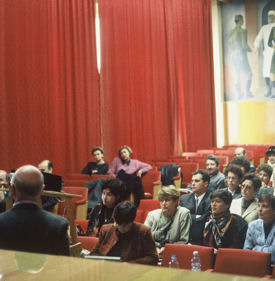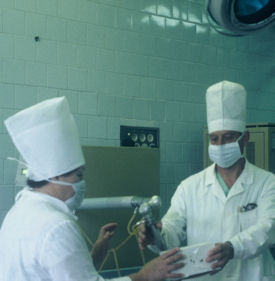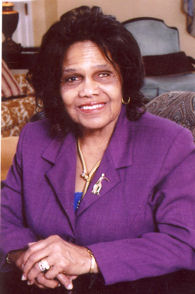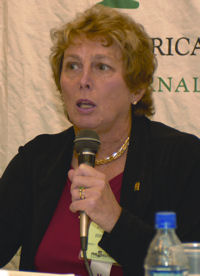Internists work on Russian health and international relations
When ACP members first began traveling to Russia in the late 1990s, the weather wsa chilly, but the reception was anything but.
In the late 1990s, when ACP members first began traveling to Russia through the Eurasian Medical Education Program (EMEP), the weather may have been chilly, but the reception they received was anything but.
“The first time I got there was in January, which is always a good time to go to Russia. It was about -30° and there were three-story ice sculptures,” said Henry Greenberg, FACP. But, he added, “There was certainly a lot of enthusiasm emerging within the Russian medical community, and they were really quite happy to have American academics come.”
Dr. Greenberg is one of about 40 medical experts, almost all in internal medicine and its sub-specialties and almost all ACP Fellows, who have volunteered their time over the past 10 years to travel to Russia and provide continuing medical education to health professionals there. The program began in 1997 when, after the fall of communism, a few U.S. internists saw an opportunity to contribute to the development of the new Russian nation by arranging for American physicians to provide education in some of the country's regional academic medical centers.
The volunteering internists usually spend about a week offering lectures and information to groups of varying size. The response from Russian physicians has ranged from initial curiosity to gratitude and long-term friendship and collaboration, participants said.
“There were several places where we were told that we were not only the first American doctors they had ever seen, but the first Americans they had ever seen,” said Richard G. Farmer, MACP, a founder of the program.
A consistent effort
Physicians in five Russian regions—Tula (south of Moscow), Ekaterinburg (in the Ural Mountains), Kazan (capital of Tatarstan), Khabarovsk and Birobidjan (in the Russian Far East)—have by now become accustomed to visits from American physicians. The program has expanded to essentially all of the provinces of central Russia, known as the Ural Federal District, and to most all of the Russian Far East.

Since 1997, about 9,000 physicians have received education through the Russian portion of the program, which typically targets the major contributors to excess mortality in the country—cardiovascular disease, diabetes, tuberculosis and HIV/AIDS, said Edward J. Burger, FACP, the program's director.
Internist volunteers prepare slides on the topic of choice, which are then passed along to a translator. Unless the U.S. physicians happen to speak Russian, they lecture in English.
The format of the programs was actually modeled on ACP regional meetings, Dr. Burger explained. The response from the audience, however, was much more sedate than it would be among ACP members because Russian medical education has not typically included much open discussion.
“We would give a talk and then some white-haired old guy would get up and make some comments. And then a slightly less gray-haired guy, etc., etc.,” said Dr. Farmer. “Finally, [Dr. Greenberg] said, ‘We will not allow anyone over the age of 35 to ask a question.’ It worked; we got much more interactive responses from the younger participants.”
The style of instruction was only one of many differences that the volunteering internists encountered in their travels. Some of the medical problems and treatments were quite different from those in the U.S. “They had been isolated from western medicine and western medical science for 70 years. So they know a lot about some aspects of medicine that we have forgotten for 50 years, for example, tuberculosis,” said Dr. Burger.

Some of the Russian techniques—keeping patients horizontal for long periods, intermittent medication—were not accordant with modern American practice, but there was still information to be gained on both ends, according to Donna E. Sweet, MACP, a program volunteer. “How we handle it might be different, but they've taught me a lot about what you can do even if you have limited resources,” she said.
Rebuilding professionalism
Before the EMEP began, Russian physicians had been waiting a long time to exchange their knowledge with colleagues. “The Soviets broke up the elements of professionalism, so that physicians couldn't engage in the sort of things that we consider elemental—going to meetings, publishing, meeting with peers. I like to think that we have been able to help reinstate them,” said Dr. Burger.
The program helped get the Russian physicians back into swing of publication by organizing several joint papers in peer-reviewed journals, including a 2005 study that ran in the American Journal of Hypertension. The article described the Russian and U.S. physicians' efforts to create a registry for hypertensive and diabetic patients at one of the Russian polyclinics, and it found that blood pressure decreased modestly over the course of the project.
EMEP organizers have also tried to measure the impact of their programs through before-and-after tests at lectures and chart reviews, and they have generally concluded that the efforts have had a positive effect on how physicians practice and on the health of Russians, Dr. Burger said.
But improved health is not the only goal of the program, which has been funded by the federal government, as well as various nonprofits including the College. “The program serves a security or strategic goal as well as a humanitarian one,” said Dr. Burger. “Engagement through professional exchanges is in the interest of both nations.”
Dr. Sweet felt the warming of international relations on a personal level during her time in Russia. “The people are kind and friendly and caring. For those of us who grew up hearing the ideas of the Cold War, it sometimes sticks and you don't really know until you meet people who are trying to make such a societal change,” she said.
The cultural lessons learned during the exchanges are sometimes humorous. Sara E. Walker, MACP, was surprised to be offered a glass of vodka when she visited a regional health minister during her presidency of the College. “Vodka was on every table, even lunch at the medicine clinic,” she said. On the other hand, Dr. Farmer was impressed by world-class opera in the smaller cities of Russia.
Russian physicians involved in the program have also had opportunities to see how medicine operates in the rest of the world. Through the EMEP, 12 groups of Russian health leaders have come to U.S. centers for more extensive experience.
And the latest incarnation of the program involves a three-way project on cardiovascular disease including Russian, American and Japanese physicians. An initial symposium was held in Russia, the second in the U.S., and a third will take place in Japan.
On another front, Dr. Greenberg is meeting with the health ministry of Moldova to set up protocols for the prevention of chronic disease and offer suggestions for how successful strategies can be applied to the local situation.
“The role of EMEP, I think, is to make those observations tangible and palpable to leadership. There's receptivity based on their educational system, a need based on their own observations, and we can give them the glue that sticks them together,” he said.




